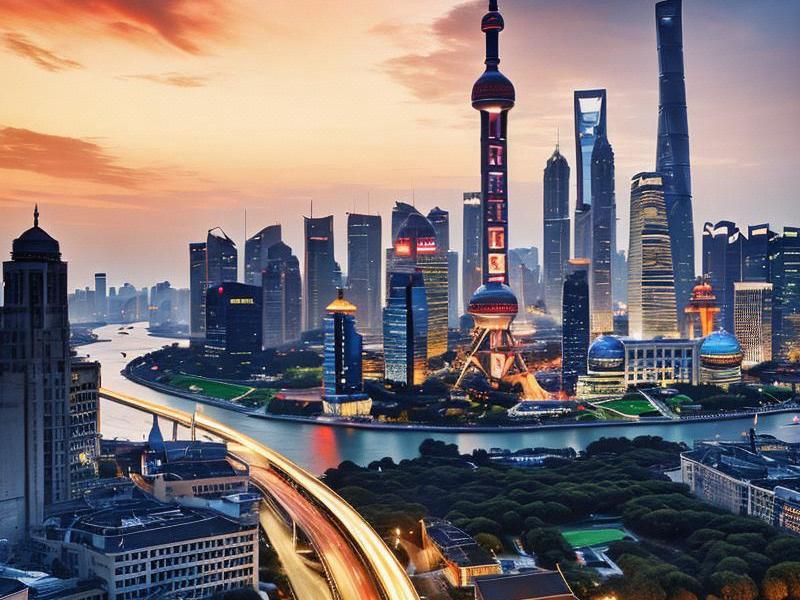This article delves into the multifaceted charm of Shanghai, exploring its status as a global metropolis, the vibrant urban development it has undergone, its position as an economic powerhouse, the rich cultural tapestry that defines it, and the increasing international influence it wields.

Shanghai, often referred to as the "Pearl of the Orient," stands as a beacon of modernity and progress in China. This bustling metropolis, located on the eastern coast of China, is not only the largest city in the country but also a significant player on the global stage. Its unique blend of tradition and modernity, coupled with its strategic location at the mouth of the Yangtze River, has made it a hub for commerce, culture, and innovation.
Over the past few decades, Shanghai has undergone a remarkable transformation. Once a colonial port city with a predominantly Western character, it has evolved into a dynamic metropolis that seamlessly integrates the old with the new. The iconic skyline of Shanghai, dominated by the Oriental Pearl Tower, the Shanghai Tower, and the Jin Mao Tower, is a testament to its rapid urban development and economic prowess.
The city's economic growth has been nothing short of spectacular. As one of China's four municipalities directly under the central government, Shanghai enjoys a high degree of autonomy and has been at the forefront of the country's economic reforms. It is home to the Shanghai Stock Exchange, one of the largest stock exchanges in the world, and serves as a major financial center for the Asia-Pacific region. The city's port, the Port of Shanghai, is the busiest container port in the world, handling millions of containers annually and connecting China to global markets.
Shanghai's economic success is not limited to finance and trade. It is also a hub for manufacturing, technology, and innovation. The city has established itself as a leader in industries such as automotive, electronics, pharmaceuticals, and information technology. Its numerous industrial parks and technology incubators attract businesses and entrepreneurs from around the world, fostering a vibrant ecosystem of innovation and entrepreneurship.
上海龙凤419
Beyond its economic achievements, Shanghai is a city that celebrates its rich cultural heritage. The Bund, a historic waterfront area, offers a glimpse into the city's colonial past with its array of Art Deco buildings and European-style architecture. In contrast, the Yu Garden, a classical Chinese garden, provides a serene escape into the traditions of old Shanghai. These two contrasting neighborhoods, separated by the Huangpu River, symbolize the city's ability to harmonize its past and present.
Cultural fusion is a defining characteristic of Shanghai. The city is a melting pot of different cultures, languages, and traditions. Its residents, known as Shanghainese, have a unique dialect and a distinctive lifestyle that sets them apart from other Chinese people. The city's cuisine, known as Shanghainese cuisine, is renowned for its sweet and savory flavors, with popular dishes including Xiaolongbao (soup dumplings) and Shengjianbao (pan-fried buns).
Shanghai's cultural scene is vibrant and diverse. The city hosts numerous art galleries, theaters, and music venues, attracting artists, performers, and audiences from around the world. The Shanghai International Film Festival, one of the oldest and most prestigious film festivals in Asia, showcases the latest works from both Chinese and international filmmakers. The city's museums, such as the Shanghai Museum and the Power Station of Art, offer a wealth of cultural experiences, from traditional Chinese art to contemporary exhibitions.
爱上海同城对对碰交友论坛
Shanghai's international influence continues to grow. It is a key member of the Global Cities Network and plays a significant role in international organizations such as the United Nations and the World Trade Organization. The city has hosted numerous international events, including the 2010 World Expo, which attracted millions of visitors from around the globe. These events have not only enhanced Shanghai's global profile but also contributed to its economic and cultural development.
The city's commitment to sustainability and green development is another aspect of its global significance. Shanghai has implemented various initiatives to reduce pollution, promote renewable energy, and improve urban living conditions. The city's green spaces, such as Century Park and Zhongshan Park, provide residents and visitors with opportunities to enjoy nature amidst the urban sprawl.
Shanghai's education system is also a key factor in its international standing. The city is home to some of the best universities in China, including Fudan University and Tongji University, which attract students and researchers from around the world. These institutions play a crucial role in fostering innovation, conducting cutting-edge research, and promoting academic exchange.
上海龙凤419
Tourism is a major industry in Shanghai, with millions of visitors flocking to the city each year to experience its unique blend of culture, history, and modernity. The city's iconic landmarks, such as the Oriental Pearl Tower, the Shanghai Tower, and the Nanjing Road shopping street, are must-see attractions. Visitors can also explore the city's lesser-known neighborhoods, such as the French Concession and the Old Town, to gain a deeper understanding of its rich history and culture.
In conclusion, Shanghai is a global metropolis that embodies the spirit of progress and innovation. Its rapid urban development, economic powerhouse status, rich cultural tapestry, and increasing international influence make it a city of endless charm. As Shanghai continues to grow and evolve, it remains a symbol of China's rise on the global stage and a source of inspiration for cities around the world.